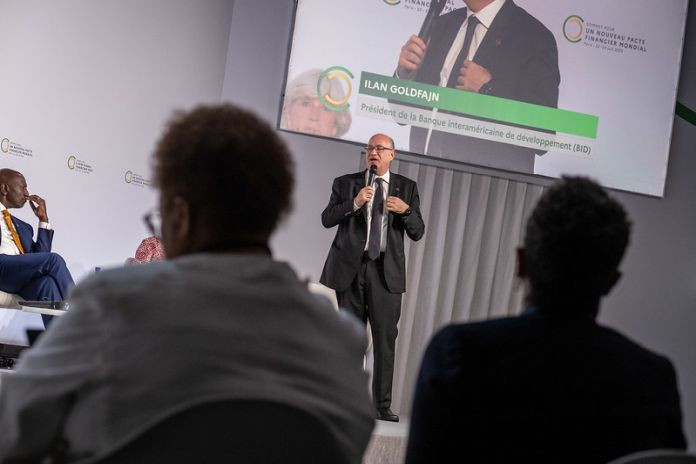PARIS, France – At the Summit for a New Global Financing Pact, Inter-American Development Bank (IDB) president Ilan Goldfajn called for multilateral development institutions, governments, the private sector and other stakeholders to intensify collaboration to scale up innovation and development impact, in a renewed approach to addressing global challenges.
President Goldfajn urged leaders to standardize, replicate and expand promising new financial instruments across countries and regions, including to help redistribute risk and mobilize critical private-sector resources.
“Given the size of the challenge that climate change and other global needs present, we must quickly standardize and replicate tools across institutions and regions,” president Goldfajn said during a panel discussion with heads of state and international leaders.
“To do so, collaboration among multilateral development banks and other stakeholders is key. We need to push past the status quo and rapidly develop instruments such as debt-for-nature swaps, sustainability-linked bonds, disaster clauses, and other tools,” he said.
President Goldfajn highlighted the successful debt-for-nature swaps by Ecuador the largest on record and Barbados. Countries in Latin America and the Caribbean are proving that innovative instruments, supported by MDBs and other actors, can create new financial space to protect the environment, he said, adding that countries are also interested in using debt swaps for health, education and other areas.
President Goldfajn also noted the emphasis on climate-resilient debt clauses at the summit. The IDB has led the way with issuances in The Bahamas, Barbados and Honduras and interest is surging in other countries and MDBs to use these instruments.
In 2021, the IDB created a product that allows governments to postpone principal payments when catastrophes strike. The Bahamas and Barbados have already activated this feature in their eligible loans.
President Goldfajn also said that Jamaica’s recent issuance of a catastrophe bond, which the country did with help from the World Bank and other stakeholders, shows how countries can creatively tackle natural disasters. He said all stakeholders should collaborate closer, including with third-party donors, to redistribute risk and expand the use of innovative instruments like this.
Another type of instrument is the sustainability-linked bond. Uruguay issued its first one, which lowers interest rates and saves the country money when it meets key environmental performance indicators, including targets for gas emissions and forest conservation.
To generate the scale needed to tackle today’s challenges, these instruments must be simplified and standardized so they can be replicated and widely adopted across countries. Because of this, collaboration among all stakeholders is essential, he noted.
The IDB has led the way with several collaborations:
- The IDB and IMF committed to stronger collaboration to address climate change and boost green finance in Latin America and the Caribbean, president Goldfajn and IMF managing director Georgieva announced.
- The IDB and the World Bank president’s travelled together to Latin America and The Caribbean in a historic visit to strengthen the collaboration among the institutions.
- The IDB is the main financing partner of the Finance in Common Summit to be held in Cartagena, Colombia, on September 4-6. It will be cohosted by AFD, Bancoldex, ALIDE (Latin American Association of Development Financing Institutions) and EIB, among other partners. It is the first time the event will take place in Latin America, with the expected participation of more than 500 institutions. Discussions will seek to build new alliances for sustainable financing in areas such as climate change and infrastructure.
- The IDB joined a coalition led by the government of Barbados of multilateral development banks and other organizations to develop resilient infrastructure and to drive new social and nature capital investments, building on the Resilience and Sustainability Facility of the IMF.
- The IDB is considering joining a new investment platform led by the World Health Organization to strengthen primary healthcare services in low and middle-income countries.
Meetings with world leaders
While at the Paris summit, president Goldfajn met with world leaders including presidents Luiz Inácio Lula da Silva of Brazil and Gustavo Petro of Colombia.
Discussions ranged from taking a coordinated, regional approach to protecting the Amazon to how the IDB can continue supporting countries through innovative financial instruments and projects.
President Goldfajn also met with Andrew Mitchell, the United Kingdom’s minister of state in the Foreign, Commonwealth and Development Office.
During the summit, president Goldfajn participated in multiple sessions with MDB leaders and other authorities, including an official high-level panel with presidents Nana Addo Akufo-Ado (Ghana) and William Ruto (Kenya), prime ministers Mia Motley (Barbados) and Muhammad Shehbaz Sharif (Pakistan), the president of the European Council Charles Michel and Laurence Tubiana, president of the European Climate Foundation. In this session, president Goldfajn called on MDB’s to scale up on innovative instruments with a pragmatic approach.
President Goldfajn also participated in a discussion with leaders including the IMF managing director Kristalina Georgieva, World Bank president Ajay Banga, and US, Treasury Secretary Janet Yellen who noted the leadership of IDB and IDB Invest on innovative instruments to mobilize capital, as well as stronger ties between the IDB and the IMF.





